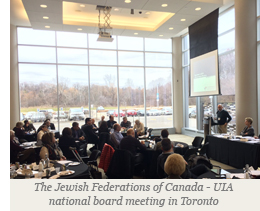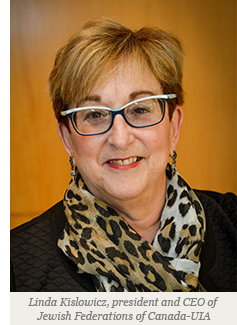This message has 926 words and will take about 4 minutes to read.
We enter this Shabbat with heavy hearts because yet another family of tremendous leaders and partners have suffered a tragic loss. Being part of a collective community is not just about the work we do to improve the lives of individuals around the globe with like-minded leaders across Canada, but about the way that we surround each other in our darkest moments.
 This week we are turning our Shabbat message over to Linda Kislowicz, president and CEO of Jewish Federations of Canada-UIA, our national body. We have asked Linda to share her perspective on the issues that Canadian Federations discussed earlier this week at our annual JFC-UIA national board meeting in Toronto. I joined three of our key volunteer leaders at these meetings: Stephen Gaerber, our board chair; Karen James, the chair of our Israel and overseas affairs committee; and Jonathan Berkowitz, a former president of our Federation. We are so lucky to not be in our work alone. We are a part of a truly special trans-Canadian community who cares about the Jewish future both locally and globally. Every year we reaffirm our commitment to this collective by contribution to its operations. This week we are turning our Shabbat message over to Linda Kislowicz, president and CEO of Jewish Federations of Canada-UIA, our national body. We have asked Linda to share her perspective on the issues that Canadian Federations discussed earlier this week at our annual JFC-UIA national board meeting in Toronto. I joined three of our key volunteer leaders at these meetings: Stephen Gaerber, our board chair; Karen James, the chair of our Israel and overseas affairs committee; and Jonathan Berkowitz, a former president of our Federation. We are so lucky to not be in our work alone. We are a part of a truly special trans-Canadian community who cares about the Jewish future both locally and globally. Every year we reaffirm our commitment to this collective by contribution to its operations.
Before we turn this message over to Linda, I would like to mention that King David High School is participating in a survey sponsored by The AVI CHAI Foundation in partnership with Prizmah and The Center for Jewish Day Schools to better understand local parents’ educational priorities – and in particular how they make choices regarding middle and high school education for their children. This research will better inform our planning for the current and future Jewish educational needs of the community. I encourage you to take this short 10 minute survey today because it'll be open for a short time.
And here are Linda’s thoughts on some of the most important issues our Federations are working on.
 What usually happens when 42 Canadian Jewish leaders come together at a JFC-UIA national board meeting? What usually happens when 42 Canadian Jewish leaders come together at a JFC-UIA national board meeting?
They do what boards do - they pass motions, they approve plans and budgets, they deliberate on the key matters of the day. They assess current opportunities and risks and provide wise counsel and advice on strategic issues facing the organization.
That said, last weekend’s semi-annual in-person meeting of the JFC-UIA national board was in fact different than recent previous gatherings.
It provided an opportunity for leaders from communities across Canada, ranging in size from 200 to 200,000 Jews, to spend time in small groups discussing some of the important topics that are on the agendas of our national and international partners. The Vancouver federation was represented by Ezra Shanken, Stephen Gaerber, Karen James and Jonathan Berkowitz.
The topics that were explored are not only strategically important to all our local Canadian federations, they are vital to the future of the Jewish people and Israel.
They speak to our collective sense of priority, our comfort - or lack thereof - with the different emerging viewpoints of Israeli and Diaspora Jews, the shift in generational attitudes, and the compelling need to understand and engage the next generation of leaders. We have a huge stake in this agenda.
Among the topics discussed were: religious pluralism in Israel and the implications for Diaspora Jewry; shifting organizational roles and funding capacities in the international sector; and the relative importance of Canadian advocacy missions with different constituencies such as political, business and even student leaders.
Like so many other boards of Jewish organizations, we struggled with how best to engage the next generation locally and questioned what role the national organization should play in supporting and leveraging the strength of this cohort. The potential for building a more connected and engaged national community was discussed with a view toward developing a two-fold approach – on the one hand, leveraging continental and international events more effectively and more regularly; on the other, creating added value through opportunities to gather and connect.
The lively conversations could have gone on longer than the time allotted. There was a tremendous sense that these types of discussions are critical in helping to strengthen the national community by more actively engaging and educating board members on today’s issues and also in learning more about the varying needs and capacities of different size organizations. The discussion provided valuable input and deepened the understanding of issues that are highly relevant to both the Canadian and global Jewish community.
The JFC-UIA board is not an easy board to understand or to navigate. Not only does it have internally managed operations - such as the full range of Canada Israel Experience programs (March of the Living Canada, Birthright Israel, MASA Israel) and the programs managed by our Israel office, notably the Coast to Coast Partnership2Gether program of which Vancouver is an integral member - it also is our chief Canadian interlocutor with many partners in the international sector. Many lay and professional board members also sit on the boards of JFNA, Keren Hayesod, the Jewish Agency and the JDC. Part of our role is to connect the dots so that the discussions at our national board table inform the work of both our federations and our international partners.
In this complex and polarized Jewish world, our goal is to ensure that we are conversant with current issues and that our organization is strategically aligned with those issues. It is through the JFC-UIA board and the active engagement of its members from across the country that our Canadian voice is heard across the globe.
And yes – we did pass the budget and approve many important motions. Because that’s what boards do.
Shabbat shalom,
Linda Kislowicz
President and CEO, Jewish Federations of Canada -UIA |

